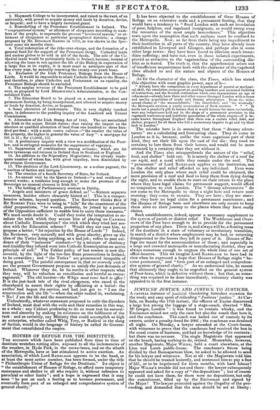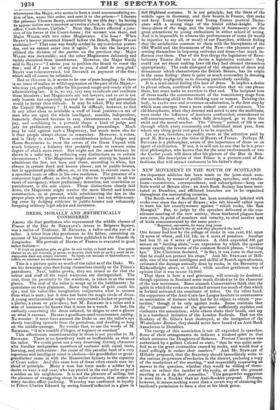JUSTICES' JUSTICE AND JUSTICE TO JUSTICES. A CAPITAL instance of
justicial blundering furnishes occasion for the ready and easy sport of ridiculing "Justices ' justice." At Car- lisle, on Sunday the 17th instant, the officers of Excise discovered a large box among the luggage of a stage-coach, directed "Mrs. 1101' Gregor, London " : it was found to contain whisky, and the Excisemen seized not only the case but also the coach that bore it, and the coachman. The coach was bailed out of custody by its owners, under a penalty-bond for 2001.; the coachman was detained all night. On Monday, a lawyer attended at the Court-house, with witnesses to prove that the coachman had received the box in the usual course of business, and had no knowledge of its contents: but there was no accuser. The single Magistrate that appeared. on the bench, having nothing to do, retired. Meanwhile, however, another Magistrate, Major WILDE, held a court elsewhere, at the Lion and Lamb public-house. The coachman's forces being divided by that Buonapartean blow, he asked to be allowed to send for his lawyer and witnesses. Not at all : the Magistrate told him that he should be treated leniently, and sentenced him to pay a fine of 251., or to be imprisoned for three months, with hard labour! Major Wu.oz's trouble did not end there : the lawyer subsequently. appeared and asked for a copy of " the depositions" ; but of course he could not have them, for there were no depositions, but only the commitment, filled up by the Exciseman and signed by the Major ! The lawyer protested against the illegality of the pro- ceeding, and demanded that the man should be set at liberty :
whereupon the Major, who seems to have a most accommodating no- tion of law, wrote this order, and sent it to the prison—" Liberate the prisoner Thomas Beaty, committed by me this day ; he having to appear before me tomorrow at twelve o'clock, in the Magistrate's office, Court-house, Carlisle." Next day, BEATY effected a junc- tion of his forces at the Court-house ; the accuser was there, and Major WILDE, with two other Magistrates. Cid bone When BEATY'S lawyer presented himself before the Bench, Major WILDE exclaimed—" That case was finally settled by my conviction yester- day, and we cannot enter into it again." In vain the lawyer ex- plained the division of the parties on the previous day : Major Wilms was inexorable ; and the other Magistrates delicately and tacitly abstained from interference. However, the Major kindly said to BEATY—" I advise you to petition the Board to remit the fine ; and if I can be of any use to you, I shall be very, glad." BEATY was reincarcerated, but liberated on payment of the fine; which will of course be refunded.
Bad as this case is, it seems to be one of pure bungling; for there is no trace of malice or wilful oppression on the part of the Major,— who may yet, perhaps, suffer for his jocund rough-and-ready style of administering law. It is, we say, very easy to ridicule and condemn these blunders ; but Magistrates are not lawyers, and to err is not only human but especially natural in their case ; and prevention would be better than ridicule. It may be asked, Why not abolish the Unpaid Magistracy ? It would be difficult, however, to find in any other class so available a staff of local justices—a set of men who are upon the whole intelligent, sensible, independent, humanely disposed because in easy circumstances, not needing pay, and combining in a portable shape a kind of judge and jury for preliminary, summary, and trifling proceedings. Much may be said against such a Magistracy, but much more also for it than people always choose to remember. Moreover, it exists, and is likely to exist. These considerations induce Judges and Home Secretaries to treat the errors of the Great Unpaid with much leniency ; a leniency that probably tends to remove some degree of check upon error. But might not the same leniency be shown in a safer way, by enforcing easy distinctions as to certain circumstances ? The Magistrate might more strictly be bound to administer the law, not here and there, according to whim, but always in certain fixed and known places; not in public-houses, but at appointed public offices, or, at the most, in certain cases, in a specified room or office in his own residence. The presence of a competent legal officer, as clerk, might also be required in all but -cases of emergency, where preliminary detention, not conviction or punishment, is the sole object. Those distinctions clearly laid down, the Magistrate might receive the most liberal and lenient construction, as at present, while administering the law in the -proper place with proper aids and appliances ; but not while court- ing error by dodging evidence in public-houses and voluntarily foregoing ordinary legal advice and assistance.























 Previous page
Previous page